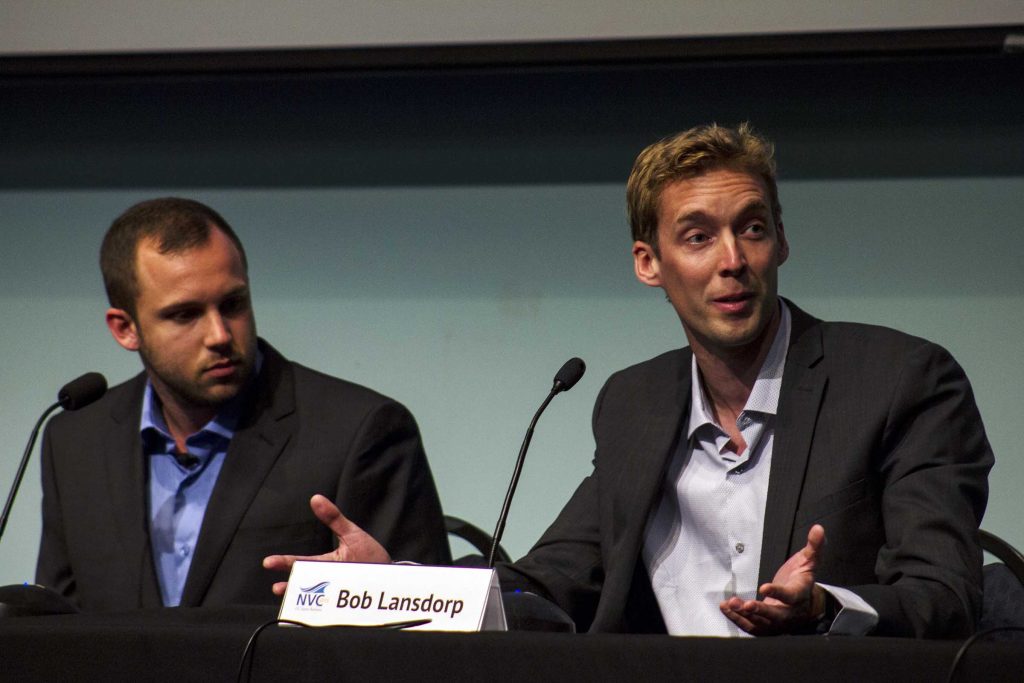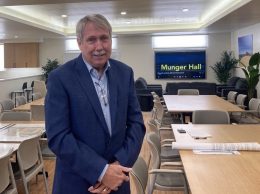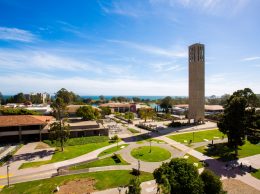Milo takes home top honors at UCSB’s New Venture Competition
IN THIS ARTICLE
- Latest news Topic
- pacbiztimes Author
By pacbiztimes Friday, May 22nd, 2015

Daniel Imberman (left) and Bob Lansdorp are a part of the Milo team that created an electronic wristband that processes sweat to monitor blood alcohol level. Milo took home a total of $20,000 at the UCSB New Venture Competition Thursday evening.
An electronic wristband that monitors blood alcohol level, eye-tracking software that quantifies advertising analytics and a chemotherapy toxicity screening technology were among the top winners at UC Santa Barbara’s annual New Venture Competition on May 21.
Six teams emerged from an initial 40 to vie for a pool of $41,500 in cash prizes at the competition, which has been around for 16 years and has produced companies like BioIQ, Phone Halo, Sirigen and Inogen. UCSB’s version of the popular TV show “Shark Tank” has paved the way for similar competitions throughout tri-county college and university campuses.
Winning the $10,000 grand prize, $7,500 for the Tech-Driven award category and another $2,500 People’s Choice award, Milo took home the top honors for developing an electronic wristband that monitors blood alcohol level through perspiration. Its sensor converts the ethanol in sweat to electricity to produce a blood alcohol level.
The team argued that personal breathalyzers are inconsistent, inaccurate and conspicuous. While breathalyzers are reactive products that rely on inebriated users to operate a multi-step process,Milo is a proactive solution that alerts users when blood alcohol levels exceed set boundaries, said Daniel Imberman, a UCSB master’s student in computer science.
“We’re in the middle of a sensor evolution,” he said. “There has been an explosion in personalized and wearable technologies all aimed at optimizing our lives.”
Imberman was joined by Evan Strenk, a film and media studies student, Bob Lansdorp, a mechanical engineering student, and Netzahvalcoyotl Arroyo, a post-doctorate student.
“This product has the potential to save lives,” said Imberman, adding that his team plans to market the product through universities and sell Milo in university stores and eventually through e-commerce sites like Amazon and Walmart.
Chemoguard Diagnostics was the second biggest winner, earning $8,500, for developing a screening test that takes a sample of a patient’s cells to predict how they will respond to chemotherapy. Then, doctors can personalize treatment accordingly. The first step to eliminating cancer is to make the drugs work a lot better, said Brett Cook, Chemoguard CEO and UCSB molecular biology graduate student.
“The cost of changing therapy after you show toxicities is really high,” Cook told the Business Times. “Then you let the cancer grow more, you’re in all this pain and you’re immune system is knocked out. So you want to get people on the right drug the first time.”
INSiiGHT, which won $7,500, is business-to-business software that enables advertisers and analytics-minded marketers to quantify what their customers look at, ignore and comprehend via eye-tracking technology.
The other teams included Slightly Nutty, a protein powder made from sustainably raised crickets, a smartphone-based hotel room key called Sesamo, and Caugnate, a visualization software that enables more efficient remote support.









